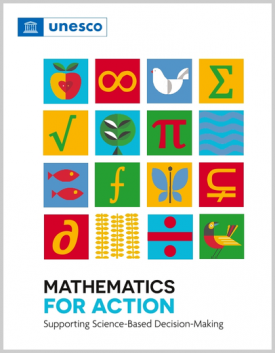March 2022
 Mathematics is extremely relevant to increasing the resilience and sustainability of our planet and better understanding the challenges it faces. To that end, the global mathematics community collaborated to produce a toolkit (an e-book) titled Mathematics for Action: Supporting Science-Based Decision Making. The toolkit is an outgrowth of a worldwide effort called Mathematics of Planet Earth, including the 5-year program called Mathematics of Planet Earth 2013+ organized by DIMACS. The toolkit, published as an open-access book by UNESCO, is closely connected to the United Nations Member States’ 2030 Agenda for Sustainable Development. This agenda includes 17 Sustainable Development Goals (SDGs) that represent an urgent call to action for all countries to collectively tackle societal and planetary challenges.
Mathematics is extremely relevant to increasing the resilience and sustainability of our planet and better understanding the challenges it faces. To that end, the global mathematics community collaborated to produce a toolkit (an e-book) titled Mathematics for Action: Supporting Science-Based Decision Making. The toolkit is an outgrowth of a worldwide effort called Mathematics of Planet Earth, including the 5-year program called Mathematics of Planet Earth 2013+ organized by DIMACS. The toolkit, published as an open-access book by UNESCO, is closely connected to the United Nations Member States’ 2030 Agenda for Sustainable Development. This agenda includes 17 Sustainable Development Goals (SDGs) that represent an urgent call to action for all countries to collectively tackle societal and planetary challenges.
The policy-oriented, open-access toolkit comprises a collection of 26 briefs that pertain to 13 of the 17 different SDGs and seeks to inform decision-makers, scientific and technical advisors, scientific attachés, parliamentarians, and diplomats about relevant applications of mathematics and statistics. It also publicizes mathematics’ relevance to global challenges, explores mathematical modeling’s ability to address “what-if” scenarios, and reveals innovative opportunities for science-based decision-making.
The toolkit was produced by an international consortium of experts under the management of Centre de Recherches Mathématiques (CRM) and included collaboration from DIMACS as well as from the African Institute for Mathematical Sciences (AIMS), African Mathematical Union (AMU), Centre de Recherches Mathématiques (CRM), UNESCO Cat II Centre CIMPA, European Mathematical Society (EMS), Institut des Sciences Mathématiques et de leurs Interactions (INSMI/CNRS), Institut de Valorisation des Données (IVADo), International Commission on Mathematical Instruction (ICMI), International Mathematical Union (IMU), and International Science Council (ISC). The 32 authors come from the five UNESCO regions. A multinational team led by Christiane Rousseau of CRM and including Fred Roberts, Emeritus Director of DIMACS, edited the document, with scientific editing and design by Barbara Cozzens of Whistling Thorn Strategies. Four of the briefs co-authored by Roberts stemmed directly from research work at DIMACS: water policy, biodiversity, modeling resilience, and measurement of gender gaps.
The toolkit was launched virtually during an online webinar on March 14, 2022: The International Day of Mathematics. It is now freely available on UNESCO’s website.
Printable version of this story: [PDF]


